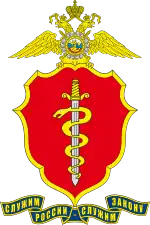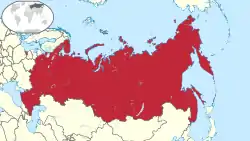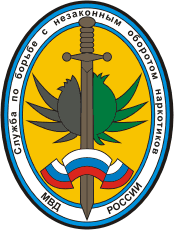Main Directorate for Drugs Control
Main Directorate for Drugs Control of the Ministry of Internal Affairs of Russia (Russian: Главное управление по контролю за оборотом наркотиков Министерства внутренних дел Российской Федерации, ГУКОН), also known as GUKON, is a law enforcement agency and the Russian Drugs police. It is responsible for the regulation of narcotics and the investigation of drug crimes. It was established by presidential decree on 4 April 2016.[1] The Directorate is part of the Public Security Service of the MVD. The Directorate (abbreviated as GUKON) has a jurisdiction overall Russia.
| Main Directorate for Drugs Control Drugs Police | |
|---|---|
 Official Emblem | |
| Abbreviation | GUKON |
| Agency overview | |
| Formed | April 5, 2016 |
| Preceding agency | |
| Jurisdictional structure | |
| National agency (Operations jurisdiction) | RUS |
| Federal agency (Operations jurisdiction) | RUS |
| Operations jurisdiction | RUS |
 | |
| GUKON influence areas | |
| Size | 17,098,242 square miles (44,284,240 km2) |
| Population | 143,441,534 (2016 est.) |
| Legal jurisdiction | Russian Federation Russian foreign drug-related investigations |
| Governing body | MVD |
| General nature | |
| Operational structure | |
| Overviewed by | Government of Russia |
| Headquarters | 19 Azovskaya, Moscow |
| Commissioner responsible |
|
| Parent agency | MVD |
| Child agency |
|
| Website | |
| mvd.ru/gunk | |
Like FSKN before, the Directorate tasked with combating drug smuggling and use within the Russian Federation. Not only is the GUKON the lead agency for domestic enforcement of the Controlled Substances Act, sharing concurrent jurisdiction with the Federal Security Service (FSB), it also has sole responsibility for coordinating and pursuing Russian drug investigations abroad.
History
During the Russian Empire, There were no specialized departments or police departments to combat drug trafficking on the territory of the Russian Empire, but these functions were carried out by the Police Department and the Medical Department of the Ministry of Internal Affairs of the Russian Empire.
For a long time, there was no specialized department to combat drug trafficking in the Soviet Union. Insufficient awareness of the seriousness of the problem, and, in part, ideological attitudes towards "the impossibility of drug addiction in Soviet society" led to the fact that such a department appeared only in 1970, although law enforcement agencies have been dealing with this problem from the very beginning of the formation of the USSR.
On 7 July 1973, an independent Department for Combating Drug Addiction of the Criminal Investigation Department of the USSR Ministry of Internal Affairs (Отдел по борьбе с наркоманией Управления уголовного розыска МВД СССР) was created. In 1989, the Drug Enforcement Department was reorganized into the 3rd Directorate for Combating Illicit Drug Trafficking and Crimes Associated with Foreign Citizens of the USSR Ministry of Internal Affairs. Two of the three divisions of the 3rd Directorate specialize in the drug problem.
On 1990, at the expense of the staffing of the USSR Ministry of Internal Affairs, the Directorate for Combating the Spread of Drug Addiction of the USSR Ministry of Internal Affairs was created. In its structure, in addition to the two central ones, seven more interregional departments for combating drug trafficking are formed, subordinate directly to the USSR Ministry of Internal Affairs. After repeated renaming and organizational changes in the system and structure of the Ministry, by order of the USSR Ministry of Internal Affairs dated 28 November 1991, this special militsiya unit was removed from the jurisdiction of the Main Directorate of the Ministry of Internal Affairs of the USSR. Instead of the previous Directorate, the Bureau for the Control of Illicit Drug Trafficking of the USSR Ministry of Internal Affairs was formed, which became an independent branch service of the criminal police.

In early 1992, the Bureau for the Control of Illegal Drug Trafficking of the Ministry of Internal Affairs merged with the First Department of the Directorate for Combating Drug Addiction and Crimes against Foreign Citizens of the Criminal Investigation Department of the Ministry of Internal Affairs of the RSFSR, which dealt with the drug problem within Russia. On the basis of these two organizational structures, the Directorate for Illegal Drug Trafficking of the Ministry of Internal Affairs of Russia (UNON) is being formed. Over the years of its existence, UNON was the main body that counteracts the spread of drugs in Russia and the criminal prosecution of persons who sell drugs and involve new victims in drug addiction – in other words, the drug mafia. UNON has performed many successful operations. Thousands of drug dealers were arrested and prosecuted. UNON worked for 12 years. During this period, a lot has changed both in the fight against drug trafficking and in Russian realities.
By the fall of 2002, the need for reforms was ripe. What was needed was a new structure, with broader powers, capable of more effectively countering the increase in the drug threat, including in the information sphere. In November 2002, the State Committee for Counteracting Illegal Trafficking in Narcotic Drugs and Psychotropic Substances was established under the Ministry of Internal Affairs of Russia (Gosnarkontrol). But six months later, it became clear that the importance of the problem required the creation of an independent department. By the decree of the President of Russia Vladimir Putin, on 1 July 2003, the State Committee of the Russian Federation was established to control the circulation of narcotic drugs and psychotropic substances. Gosnarkokontrol of Russia was involved in management in all areas, one way or another related to drugs, with their legal or illegal circulation. On 9 March 2004, the President of Russia signed Decree No. 314 "On the System and Structure of Federal Executive Bodies" in accordance with which the State Drug Control Service of Russia was renamed the Federal Service of the Russian Federation for the Control of Drug Trafficking (FSKN of Russia), which became one of the mose powerful federal services in Russia. But during its existence their activities met with strong criticism of the FSB and MVD for their efficiancy and a structural reform was needed.
On 5 April 2016, the President of Russia signed Decree No. 156 abolishing the Federal Drug Control Service and transferring its functions to the Ministry of Internal Affairs of Russia. Since April 2016, the functions of the Federal Drug Control Service of Russia have been performed by the Main Directorate for Drug Control of the Ministry of Internal Affairs of the Russian Federation. On 13 April 2016, Lieutenant General of Police Andrei Ivanovich Khrapov was appointed Chief of the Main Directorate.
Directors
| # | Director | Years | President | Notes |
|---|---|---|---|---|
| 1 | Alexander Sergeyev | September 1992 – September 2002 | Yeltsin, Putin | Head of the MVD's Directorate of the Drugs Law Enforcement (UNON) |
| — | See here | 2003–2016 | Putin, Medvedev | Director of Federal Drug Control Service of Russia |
| 2 | Andrei Khrapov | April 2016 – | Putin | Head of the MVD's Main Directorate for Drugs Control (GUKON) |
References
- "Указ Президента Российской Федерации от 04.04.2016 г. № 156, "О совершенствовании государственного управления в сфере контроля за оборотом наркотических средств, психотропных веществ и их прекурсоров и в сфере миграции"". kremlin.ru (in Russian). Президент РФ. 4 April 2016. Retrieved 12 October 2020.